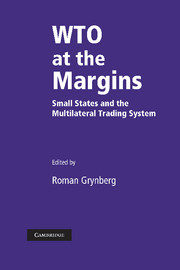Book contents
- Frontmatter
- Contents
- List of figures and appendices
- List of tables
- List of contributors
- Introduction
- Part I Theory and evidence
- Part II WTO and small economies
- Part III WTO dispute settlement
- Part IV Negotiating issues and institutional arrangements
- 17 WTO fisheries subsidies negotiations: implications for ACP fisheries access arrangements and sustainable management
- 18 Plurilateral financial standards and their regulation: the experience of small developing states
- 19 Export processing zones and the WTO Agreement on Subsidies and Countervailing Measures
- 20 The accession of Vanuatu to the WTO: lessons for the multilateral trading system
- Index
19 - Export processing zones and the WTO Agreement on Subsidies and Countervailing Measures
Published online by Cambridge University Press: 05 May 2010
- Frontmatter
- Contents
- List of figures and appendices
- List of tables
- List of contributors
- Introduction
- Part I Theory and evidence
- Part II WTO and small economies
- Part III WTO dispute settlement
- Part IV Negotiating issues and institutional arrangements
- 17 WTO fisheries subsidies negotiations: implications for ACP fisheries access arrangements and sustainable management
- 18 Plurilateral financial standards and their regulation: the experience of small developing states
- 19 Export processing zones and the WTO Agreement on Subsidies and Countervailing Measures
- 20 The accession of Vanuatu to the WTO: lessons for the multilateral trading system
- Index
Summary
Introduction
Many of the Commonwealth's developing countries have established export processing zones (EPZs) as trade policy instruments designed to promote non-traditional exports. Typically, these programmes provide that if a company locates a manufacturing facility within a geographically delimited zone, and exports all or most of its products, it will be provided with a number of incentives. These incentives range from exemption from various direct and indirect taxes and customs duties to provision of a number of free or low-cost services. EPZs located in developing countries typically provide the greatest number of incentives.
The WTO's Agreement on Subsidies and Countervailing Measures (SCM) contains specific definitions, restrictions and implementation deadlines in relation to the use of export subsidies. These rules may affect incentives granted to EPZ companies in Commonwealth developing countries that are currently WTO Members or are contemplating accession.
This chapter aims to highlight some of the potential conflicts between the SCM Agreement and EPZ incentives. It should be borne in mind, however, that each EPZ will have particular regulatory characteristics and that each Commonwealth WTO Member may have differing bilateral or regional obligations. The comments made in this chapter can, therefore, only be general in nature and should not substitute a case-by-case review of EPZ incentives.
Agreement on Subsidies and Countervailing Measures
The SCM Agreement came into effect on 1 January 1995 and builds on Article XVI of the General Agreement on Tariffs and Trade 1947 (GATT) and the earlier Agreement on Interpretation of and Application of Articles VI, XVI and XXIII. The SCM Agreement provides a more or less complete code in relation to the use of subsidies that reference back to GATT 1947 and the earlier Agreement on Interpretation is not necessary in most instances.
- Type
- Chapter
- Information
- WTO at the MarginsSmall States and the Multilateral Trading System, pp. 684 - 692Publisher: Cambridge University PressPrint publication year: 2006



